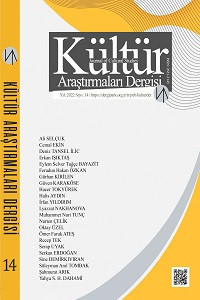Wells’in Dünyalar Savaşı Romanında Apokaliptik Özelliklerin İncelenmesi
H. G. Wells'in Dünyalar Savaşı, dünyanın yabancılar tarafından işgalinin ilk edebi anlatımı olarak kabul edilir ve güçlü kıyamet imgeleri içeren ilk büyük edebi metinlerden biridir. Bu amaçla, bu makale öncelikle Frank Kermode'un The Sense of an Ending adlı önemli eserinden yola çıkarak kıyamet kavramına ve kıyamet teorisine genel bir bakış sunmayı ve ardından Dünyalar Savaşı'nın kıyamet özelliklerini incelemeyi amaçlamaktadır. Dünyalar Savaşı'ndaki kıyamet özelliklerinin incelenmesi Wells'in romanının Kermode'un kıyamet tasarımına büyük ölçüde karşılık geldiğini göstermektedir. Kıyamet imgeleri söz konusu olduğunda roman, terör ve panik olaylarının zengin ve çeşitli örneklerinin yanı sıra, manzaranın tahribatına da yer vermektedir. Dolayısıyla Dünyalar Savaşı'nın dünyanın gerçek sonunu anlatan kıyamet tanımına uyduğu ileri sürülebilir. Başka bir ifadeyle roman, dünyayı kurtarma ve yeni bir nizam oluşturma konusunda beşeri hiçbir girişim veya başarı olmadığı için ilahi bir kıyamet modeli sunmaktadır.
Anahtar Kelimeler:
Dünyalar Savaşı, H. G. Wells, kıyamet, yıkım, son
Investigation of Apocalyptic Features in the War of the Worlds by Wells
H. G. Wells’s The War of the Worlds is considered to be the first literary recount of the invasion of Earth by outsiders and it is one of the first major literary texts that contain powerful apocalyptic imagery. To this end, this paper first aims to provide a general overview of the apocalypse concept and apocalyptic theory based on Frank Kermode’s prominent work entitled The Sense of an Ending, and then to investigate the apocalyptic features of The War of the Worlds accordingly. The investigation of the apocalyptic features in The War of the Worlds shows that Wells’s novel corresponds to Kermode’s apocalyptic pattern to a great extent. As far as the apocalyptic images are concerned, the novel provides rich and various examples of terror and panic along with depictions of the destruction of the landscape. Therefore, it can be suggested that The War of the Worlds fits the definition of an apocalypse which describes the actual end of the world. In other words, the novel presents a mostly divine apocalypse as there are no human attempts or successes involved in saving the world and establishing a new order.
Keywords:
The War of the Worlds, H. G. Wells, apocalypse, destruction, end,
___
- Benjamin, Marina (1998). Living at the End of the World. London: Picador.
- Berger, James (1999). After the End: Representations of Post-Apocalypse. London: University of Minnesota Press.
- Bergonzi, Bernard (1961). The Earthly H.G. Wells: A Study of the Scientific Romances. Manchester: University of Manchester Press.
- Bull, Malcolm (ed.) (1995). Apocalypse Theory and The Ends of the World. Oxford: Blackwell.
- Clark, Stephen R. L. (2000). “The End of the Ages”. Imagining Apocalypse: Studies in Cultural Crisis. Ed. David Seed. London: Macmillian, 27-44.
- Cohn, Norman (1970). Medieval Millenarism: Its Bearing on the Comparative Study of Millenarian Movements”. Millenial Dreams in Action: Studies in Revolutionary Religious Movements. Ed. Sylvia L. Thrupp. New York: Schocken.
- Derrida, Jacques (1984). “Of an Apocalyptic Tone Recently Adopted in Philosophy”. Trans. John P. Leavey. The Oxford Literary Review, 6(2): 3-37.
- Draper, Michael (1987). Modern Novelists: H.G. Wells. London: MacMillan.
- Enzensberger, Hans Magnus (1982). Critical Essays. New York: Continuum.
- Fitting, Peter (2000). “Estranged Invaders: The War of the Worlds”. Learning from Other Worlds: Estrangement, Cognition, and the Politics of Science Fiction and Utopia. Ed. Patrick Parrinder. Liverpool: Liverpool UP.
- Garrard, Greg (2004). Ecocriticism. London & New York: Routledge.
- Hammond, Andrew (2011). “The Twilight of Utopia: British Dystopian Fiction and the Cold War” The Modern Language Review, (106)3: 662-681.
- Kermode, Frank (2000). The Sense of an Ending. New York: Oxford UP.
- Mackenzie, Norman & Mackenzie, Jeanne (1973). H.G. Wells: A Biography. New York: Simon.
- Pinter, Karoly (2012). “The Analogical Alien: Constructing and Construing Extraterrestrial Invasion in Wells’s The War Of the Worlds”. Hungarian Journal of English and American Studies, (18)2: 133-149.
- Quinby, Lee (1994). Anti-Apocalypse: Essays in Genealogical Criticism. Minneapolis: University of Minneapolis Press.
- Wells, H. G. (2013). The War of the Worlds. New York: Tribeca Books.
- ISSN: 2651-3145
- Yayın Aralığı: Yılda 4 Sayı
- Başlangıç: 2018
- Yayıncı: Mehmet Ali YOLCU
Sayıdaki Diğer Makaleler
Evrensel Sergi Anlayışı ve Mimariye Etkileri
Laz Halk Masallarında Yer Alan Mitolojik ve Olağanüstü Varlıklar
Homi Bahbha'nın "Kültürel Çeviri" Kavramına Çeviribilimsel Bakış
Bir Risalede Halk Hekimliği ve Halk İnançlarına Dair Unsurlar
Wells’in Dünyalar Savaşı Romanında Apokaliptik Özelliklerin İncelenmesi
Türkiye'de Yazılan Maddi Kültür Başlıklı Lisansüstü Tezlerin İncelenmesi
Can Yücel'in Sevgi Duvarı Şiir Kitabına Hermeneutik Yaklaşım
Coğrafi İşaretleri Açısından Balıkesir İli Üzerine Bir Değerlendirme
